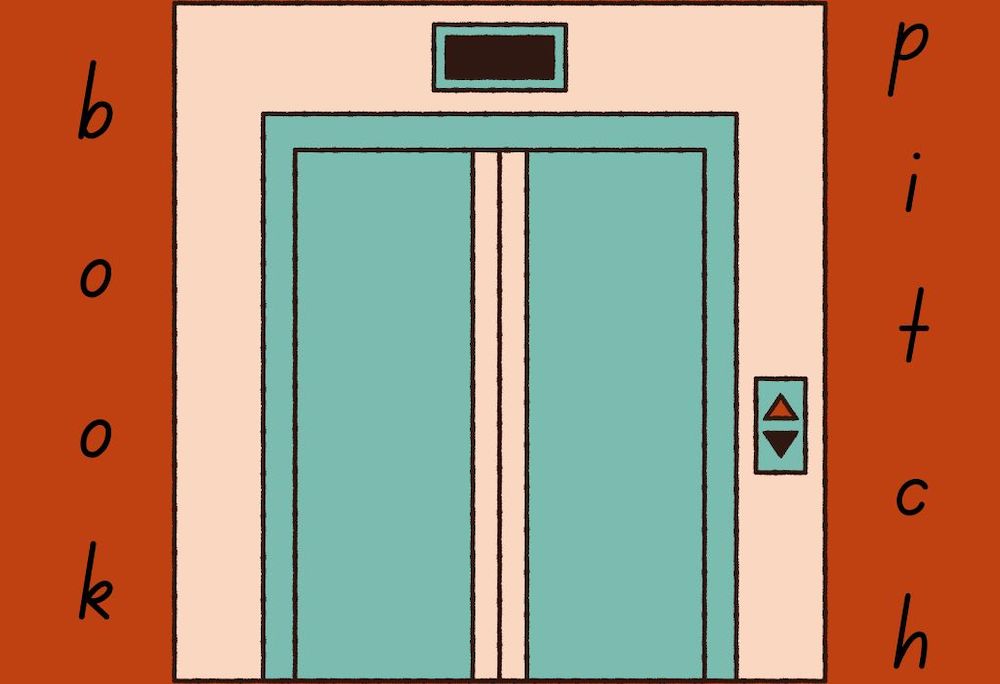It never hurts to try other ways to pitch literary agents besides querying. There are more people than ever writing books. While AI won’t be replacing writers any time soon, AI-written query letters have unfortunately started clogging up literary agents’ already overflowing slush piles.
If you’re in the querying trenches, you may be feeling discouraged about your chances of standing out in agents’ inboxes. Luckily, there’s more than one way to query! Here are three great ways to pitch to literary agents that don’t involve the dreaded query letter.

What is a book pitch?
A book pitch is a brief description of what your book is about. This includes why people should read it, and what makes your book marketable. We get it, it seems like a lot! But you should be able to express this concisely in both a query letter and a short elevator pitch.
- For non-fiction (including biographies, autobiographies, and memoirs): Describe what your book is about, why it’s a timely book people will want to read now, and what experience you have that makes you an expert on the topic.
- For fiction: Describe where your story is set, who the main characters are, and what the inciting incident is that drives the story forward (i.e. what is your MC trying to achieve and what’s holding them back?)
For any type of pitch, you should have a few comp titles on hand just in case. Having comparable books will show agents that you know the market. They’ll also see that you have a firm grasp of your book’s genre, and understand where your book will fit in.

1. In-person pitching
If you’d like to seek out opportunities to rub shoulders with agents or editors, a writer’s conference or similar is a great place to start. Many writing events host lightning-round sessions with agents (like Pitch Slam at the Writer’s Digest Annual Conference). These give you a few minutes of face-to-face time to convince an agent to read your book.
However, as writing conferences generally charge a ticket fee to attend, check beforehand to make sure they are offering events where you can meet with and pitch to literary agents.
Remember that you only have a few minutes to make a good impression, so use your time wisely. Perfect your pitch and narrow it down to 60-90 seconds (the average duration of an elevator ride).
Tips for pitching in-person:
- Always do your research beforehand. Don’t just pitch to any agent—this will lessen your chances of success. Pick agents and editors who are interested in your genre. Check their socials or MSWL pages to see if they’re looking for specific stories.
- Practise beforehand. Time your pitch and practise saying it in front of a mirror. Make sure you don’t talk too fast! You don’t want to take too long, but neither do you want to rush. If you’re part of a writing group, ask if you can test out your pitch and get feedback. Or get a professional opinion through our author coaching. We can help you to polish up your pitch so that you have the best chance of piquing an agent’s interest!
As long as you prepare, you’ll have a great shot pitching to a literary agent in-person. And don’t worry if you’re nervous, this is completely natural. Look at a pitch session as an interview—you want to make sure an agent is the right fit for you, just like they want to make sure you’re right for them. After all, you’ll have a very close working relationship with your agent. So, ensure the two of you vibe well together!

2. Join writing competitions
These days, very few writing competitions guarantee prize money or publication. But that doesn’t mean they aren’t a great way to network with industry professionals. At the very least, writing competitions can offer a chance to get your foot in the door so that you can meet and pitch your book to literary agents.
- A few writing competitions to consider:
- Bath Novel Award: Open to unpublished, self-published, or independently published authors!
- First Novel Award: Open to unrepresented and unpublished fiction authors.
- Anthology Short Story Competition: Short stories are a great way to break into publishing, get your name out there, and add some published work you can mention in your query letter. Anthology is a renowned competition open to anyone in the world.
To increase your chances of winning, only submit your best, most polished work. NEVER send in an unedited manuscript or story to a competition. Editing your book is one of the most important steps of the writing process. Make sure to first go through several rounds of self-edits and get objective feedback from beta readers or a professional book editor.

3. Writing workshops (offered by agents or publishers)
Another great way to pitch to literary agents (other than via traditional querying) is through writing workshops. But be mindful that not all writing workshops are legit. Anyone can sell anything online these days, so take care to choose workshops run by legitimate publishers and agents. For example, the WriteNow program run by Penguin or the Breakthrough Writers’ Programme through Curtis Brown are two great workshops for authors. Alternatively, our author coaching offers workshop benefits in a one-on-one setting. You can hone your skills, develop ideas, and learn about the publishing industry with a knowledgable professional writing coach.
But why is a writing workshop a great idea? Because they give you more time to work on your craft (usually over a period of weeks) while rubbing shoulders with agents and editors. Bonnie Garmus, author of the bestseller Lessons in Chemistry, is one such success story. She found her agent through a writing workshop she took with literary agency Curtis Brown!
While writing workshops can be pricey and won’t guarantee you’ll land an agent, they can still be a worthwhile investment. You’ll learn about the publishing industry, receive mentorship on the writing craft, connect with other writers, and have a chance to network with people in the industry you might not get to meet otherwise. Even if it doesn’t pay off right away, having great industry connections can help you throughout your career as a writer.
But is traditional querying still worthwhile?
Absolutely! While these are some great alternative ways to pitch to literary agents, they aren’t meant to replace traditional querying. Most authors still land their against through traditional querying, so it’s worthwhile to perfect that written pitch, too. You should know how to put together a good query letter and pitch package, when is the best time to query agents, and what to do if an agent shows interest in your book.
These three pitch options are meant to supplement your querying journey and give you more avenues to connect with agents and editors. Hopefully, they’ll widen your scope of possibilities so that—as long as you’ve written a captivating book, dedicated plenty of time to editing it, and polished up your pitch package—you’ll have the best chance possible of landing your dream agent!


